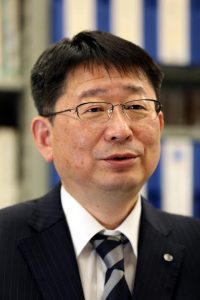Interview with Noriyuki Kawano, Director of the Center for Peace, Hiroshima University Citizens should discuss the meaning of the Sister Park Arrangement between Hiroshima Peace Park and Pearl Harbor National Memorial
Jun. 25, 2023
by Hiromi Morita, Staff Writer
The Hiroshima City government announced it will sign a sister park arrangement with the United States between Hiroshima Peace Memorial Park (Hiroshima’s Naka Ward), built on the delta in the center of the city devastated by the atomic bomb dropped by the United States forces, and Pearl Harbor National Memorial in the State of Hawaii, where there is a memorial to mourn the victims of the attack on Pearl Harbor by the former Japanese Army. How should the people of the A-bombed city react to this? We asked Noriyuki Kawano, Director of the Hiroshima University’s Center for Peace, who specializes in nuclear disasters (including the atomic bombings) and Peace Studies.
If there is an advantage to this arrangement, it is that it would give us an opportunity to offer perspectives on the damage inflicted and suffered from both sides of the war and reflect on that damage.
When I leaned of this arrangement, I had an uncomfortable feeling because the attack on Pearl Harbor and the atomic bombing were talked about on the same line. The Hiroshima City government says, “The arrangement between the two parks, which is linked to the beginning and the end of the war, will allow us to endure the grief of the past and overcome our hatred, making it possible to play a bridge of future-oriented peace and reconciliation.” If the war began with the attack on Pearl Harbor and ended with the atomic bombing of Hiroshima, the bombing might be “justified” as "something Japan brought on itself.” It would appear that the A-bombed city has given its stamp of approval to the United States' claim that "the atomic bombing was necessary to hasten the end of the war."
A-bomb survivors’ feelings toward the United States are still complicated, with some wanting an apology. If we say future-oriented, we cannot turn our eyes away from the locus of responsibility for the war and the atomic bombing as well as historical issues arising from it. We must be prepared to face the historical issues not only between Japan and the United States, but also between Japan and other countries, including South Korea and China, as well as our own responsibility for the damage we have caused.
In the future, it would be a shame if there were no argument from the citizens of the A-bombed city. Only when we discuss and share the reason for the hazy feeling that comes from it, asking “why” about the arrangement and what the arrangement means for the A-bombed city, can we say that it is future-oriented. If we don't question this, we may not be worthy of the name "A-bombed city of Hiroshima." The city government also needs to be more specific to its citizens about what it wants to do through the agreement.
(Originally published on June 25, 2023)
The Hiroshima City government announced it will sign a sister park arrangement with the United States between Hiroshima Peace Memorial Park (Hiroshima’s Naka Ward), built on the delta in the center of the city devastated by the atomic bomb dropped by the United States forces, and Pearl Harbor National Memorial in the State of Hawaii, where there is a memorial to mourn the victims of the attack on Pearl Harbor by the former Japanese Army. How should the people of the A-bombed city react to this? We asked Noriyuki Kawano, Director of the Hiroshima University’s Center for Peace, who specializes in nuclear disasters (including the atomic bombings) and Peace Studies.
If there is an advantage to this arrangement, it is that it would give us an opportunity to offer perspectives on the damage inflicted and suffered from both sides of the war and reflect on that damage.
When I leaned of this arrangement, I had an uncomfortable feeling because the attack on Pearl Harbor and the atomic bombing were talked about on the same line. The Hiroshima City government says, “The arrangement between the two parks, which is linked to the beginning and the end of the war, will allow us to endure the grief of the past and overcome our hatred, making it possible to play a bridge of future-oriented peace and reconciliation.” If the war began with the attack on Pearl Harbor and ended with the atomic bombing of Hiroshima, the bombing might be “justified” as "something Japan brought on itself.” It would appear that the A-bombed city has given its stamp of approval to the United States' claim that "the atomic bombing was necessary to hasten the end of the war."
A-bomb survivors’ feelings toward the United States are still complicated, with some wanting an apology. If we say future-oriented, we cannot turn our eyes away from the locus of responsibility for the war and the atomic bombing as well as historical issues arising from it. We must be prepared to face the historical issues not only between Japan and the United States, but also between Japan and other countries, including South Korea and China, as well as our own responsibility for the damage we have caused.
In the future, it would be a shame if there were no argument from the citizens of the A-bombed city. Only when we discuss and share the reason for the hazy feeling that comes from it, asking “why” about the arrangement and what the arrangement means for the A-bombed city, can we say that it is future-oriented. If we don't question this, we may not be worthy of the name "A-bombed city of Hiroshima." The city government also needs to be more specific to its citizens about what it wants to do through the agreement.
(Originally published on June 25, 2023)








